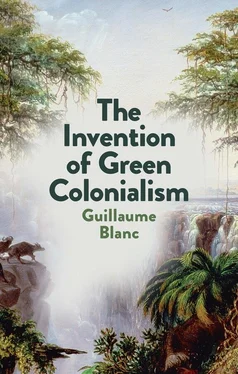1 Cover
2 Title Page The Invention of Green Colonialism GUILLAUME BLANC Translated by Helen Morrison polity
3 Copyright Originally published in French as L’invention du colonialisme vert. Pour en finir avec le mythe d’Éden africain. Préface de François-Xavier Fauvelle © Flammarion, Paris, 2020 This English edition © Polity Press, 2022 1892 maps of Ethiopia: ‘Carta dimostrativa dell’ Etiopia’. Credit: Library of Congress, Geography and Map Division. Polity Press 65 Bridge Street Cambridge CB2 1UR, UK Polity Press 101 Station Landing Suite 300 Medford, MA 02155, USA All rights reserved. Except for the quotation of short passages for the purpose of criticism and review, no part of this publication may be reproduced, stored in a retrieval system or transmitted, in any form or by any means, electronic, mechanical, photocopying, recording or otherwise, without the prior permission of the publisher. ISBN-13: 978-1-5095-5090-6 A catalogue record for this book is available from the British Library. The publisher has used its best endeavours to ensure that the URLs for external websites referred to in this book are correct and active at the time of going to press. However, the publisher has no responsibility for the websites and can make no guarantee that a site will remain live or that the content is or will remain appropriate. Every effort has been made to trace all copyright holders, but if any have been overlooked the publisher will be pleased to include any necessary credits in any subsequent reprint or edition. For further information on Polity, visit our website: politybooks.com
4 Preface to the English Edition: History as a Starting Point Notes
5 Acknowledgements
6 Introduction
7 1 Deconstructing Our Beliefs, (Re)thinking Nature Social injustice and ecological absurdity Green colonialism Understanding Africa through Ethiopian history Notes
8 2 Turning Africa into Parkland (1850–1960) Eden and its fall The ecological impact of colonization The myths underpinning colonialism From game reserves to national parks Nature idealized and exploited Colonial organizations, international institutions Notes
9 3 A Special Project for Africa (1960–1965) The beginnings of the WWF The myth of the lost forest The colonists leave; the experts remain The truth of networked texts Notes
10 4 The Expert and the Emperor (1965–1970) A certain idea of Africa Making the colonial dream come true The diaspora of experts Laying down the law in Africa? A global game Protecting nature, wielding power Notes
11 5 Violence Below the Surface of Nature (1970–1978) One national park, (too) many actors The myth, the state and the peasant UNESCO and the dictator Notes
12 6 The Sustainable Development Trap (1978–1996) Nature remains a national issue Nature remains a colonial idea A new way of seeing Africa? A new way of seeing the Africans New ethic, old ways Notes
13 7 The Fiction of the Community Approach (1996–2009) The spectre of degradation A useful myth Parks for people, against the people The disintegration of the community The people sacrificed to world heritage Notes
14 8 The Roots of Injustice (2009–2019) A new poverty A different park for different people Beyond nature: absurdity A never-ending injustice Notes
15 Conclusion Notes
16 Afterword: Looking Ahead Notes
17 Index
18 End User License Agreement
1 IntroductionEthiopia and its first three national parks
1 Cover
2 Table of Contents
3 Title Page
4 Copyright
5 Preface to the English Edition: History as a Starting Point
6 Acknowledgements
7 Introduction
8 Begin Reading
9 Conclusion
10 Afterword: Looking Ahead
11 Index
12 End User License Agreement
1 iii
2 iv
3 vii
4 viii
5 ix
6 x
7 xi
8 xii
9 xiii
10 xiv
11 1
12 2
13 3
14 4
15 6
16 7
17 9
18 10
19 11
20 12
21 13
22 14
23 15
24 16
25 17
26 18
27 19
28 20
29 21
30 22
31 24
32 25
33 27
34 28
35 29
36 30
37 31
38 32
39 33
40 34
41 35
42 36
43 37
44 38
45 39
46 40
47 41
48 42
49 43
50 44
51 45
52 47
53 48
54 49
55 50
56 51
57 52
58 53
59 54
60 55
61 56
62 57
63 58
64 59
65 60
66 61
67 62
68 63
69 64
70 66
71 67
72 69
73 70
74 71
75 72
76 73
77 74
78 75
79 76
80 77
81 78
82 79
83 80
84 81
85 82
86 83
87 84
88 85
89 86
90 88
91 89
92 91
93 92
94 93
95 94
96 95
97 96
98 97
99 98
100 99
101 100
102 101
103 102
104 103
105 104
106 106
107 107
108 109
109 110
110 111
111 112
112 113
113 114
114 115
115 116
116 117
117 118
118 119
119 120
120 121
121 122
122 123
123 124
124 125
125 126
126 127
127 128
128 129
129 131
130 132
131 133
132 134
133 135
134 136
135 137
136 138
137 139
138 140
139 141
140 142
141 143
142 144
143 145
144 146
145 147
146 148
147 150
148 151
149 153
150 154
151 155
152 156
153 157
154 158
155 159
156 160
157 161
158 162
159 163
160 164
161 165
162 166
163 167
164 168
165 169
166 170
167 171
168 173
169 174
170 175
171 176
172 177
173 178
174 179
175 180
176 181
177 182
178 183
179 184
180 185
181 212
182 213
183 214
184 215
185 216
186 217
187 218
188 219
189 220
190 221
191 222
192 223
The Invention of Green Colonialism
GUILLAUME BLANC
Translated by Helen Morrison
polity
Originally published in French as L’invention du colonialisme vert. Pour en finir avec le mythe d’Éden africain. Préface de François-Xavier Fauvelle © Flammarion, Paris, 2020
This English edition © Polity Press, 2022
1892 maps of Ethiopia: ‘Carta dimostrativa dell’ Etiopia’. Credit: Library of Congress, Geography and Map Division.
Polity Press
65 Bridge Street
Cambridge CB2 1UR, UK
Polity Press
101 Station Landing
Suite 300
Medford, MA 02155, USA
All rights reserved. Except for the quotation of short passages for the purpose of criticism and review, no part of this publication may be reproduced, stored in a retrieval system or transmitted, in any form or by any means, electronic, mechanical, photocopying, recording or otherwise, without the prior permission of the publisher.
ISBN-13: 978-1-5095-5090-6
A catalogue record for this book is available from the British Library.
The publisher has used its best endeavours to ensure that the URLs for external websites referred to in this book are correct and active at the time of going to press. However, the publisher has no responsibility for the websites and can make no guarantee that a site will remain live or that the content is or will remain appropriate.
Читать дальше












